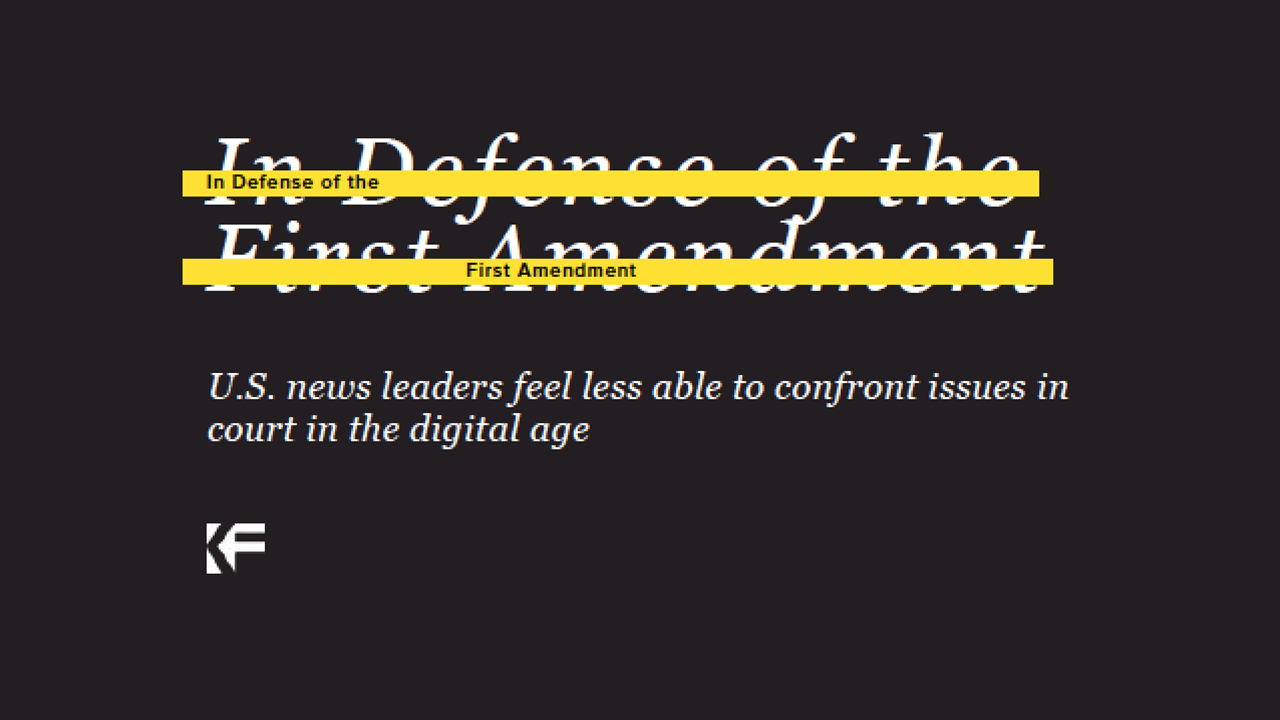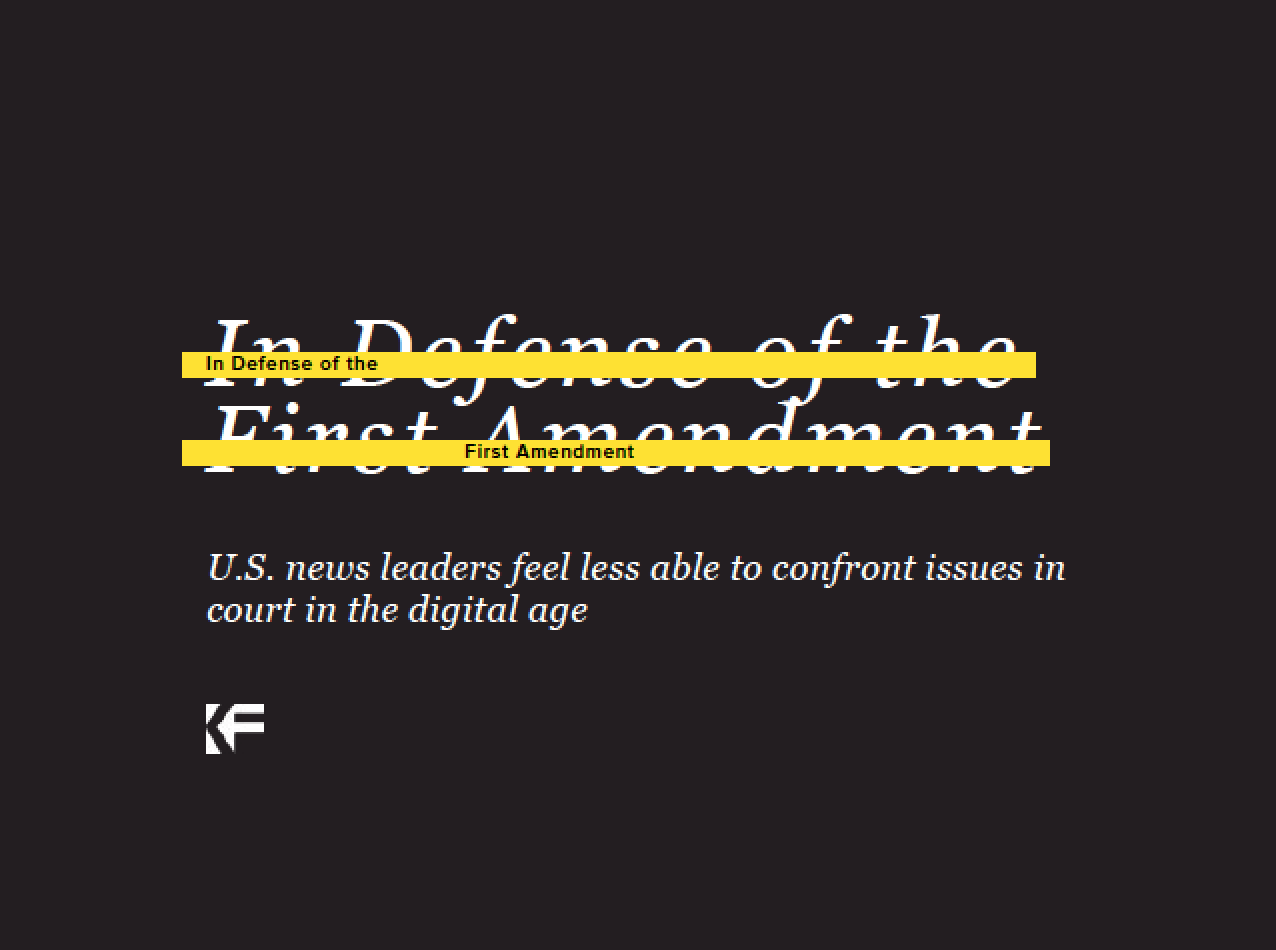
A news industry ‘less able’ to defend freedom
Not all that long ago, a Florida state law told newspapers what they could publish. A political candidate could have equal space in a newspaper to reply to criticism. It did not matter if the criticism was true and the reply was false. Equal time was the rule on TV. Florida thought it should apply to newspapers.
Download the report here (PDF) RELATED LINK
News organizations’ ability to champion First Amendment rights is slipping, survey of leading editors finds – Press release, 4/21/2016
Jack Knight’s Miami Herald disagreed. So did the U.S. Supreme Court, unanimously. In 1974, in Miami Herald Publishing Co. v. Tornillo, the court overturned the state law. It was a notable example of the newspaper industry standing up not just for the free press, but for the rights of everyone.
Newspapers won several key First Amendment cases in the second half of the 20th century. Will they do so again in the 21st? We don’t know. So Knight Foundation, the American Society of News Editors, the Associated Press Media Editors and the Reporters Committee for Freedom of the Press surveyed top editors nationwide. The poll represented news leaders, not a cross section of all papers.
The results are sobering. Nearly two-thirds (65 percent) of the editors who responded rated the news industry as “less able” to pursue legal activity around First Amendment-related issues than it was 10 years ago. A majority (53 percent) agreed with the statement, “News organizations are no longer prepared to go to court to preserve First Amendment freedoms.”
Why? Nine in 10 said it’s money. Sure, many editors can still defend themselves when attacked. But other cases – such as gaining access to documents or court proceedings – require journalists to sue. Some 44 percent of the editors said their own news organizations were less likely to do that than in the past. Should our freedoms depend on whether businesses have the money to defend them? Should we have less freedom because the digital age has upended the media’s business model?
That same digital age is bringing new types of freedom of expression cases, involving police body cams, spying and hacking at home as well as the global threat of Europe’s “right to be forgotten.” Seven in 10 leading newspaper editors agreed with the statement, “First Amendment law has not kept up with technological developments.” Nearly nine in 10 agreed, “In the digital age, there are many unsettled legal questions about the scope of free expression.”
Our survey partners agreed this isn’t a fight we can duck.
“The news in this report is, unfortunately, not too surprising. Most of us in the news industry have felt the bite of budget and resource cuts, and while the First Amendment is one of our most important missions, we all have to pick our battles wisely,” said Laura Sellers, president of Associated Press Media Editors and managing editor of The Daily Astorian in Oregon.
“When your news staff has been cut by half or more and more cuts loom, it’s tough to talk about hiring a lawyer and going to court. But that’s exactly when you have to defend your rights,” said Teri Hayt, executive director of the American Society of News Editors.
“One telling indicator is that only 6 percent have used the pro bono services of a nonprofit or law school clinic. There is a big opportunity here. Nonprofit legal organizations and clinical students at law schools could be more of a solution,” added Bruce Brown, executive director of the Reporters Committee for Freedom of the Press.
I agree with them all. The First Amendment may be 225 years old this year, but in some ways it is new every year – because it is shaped by the decisions of our Supreme Court. Journalists do what we have to do to stand up for it. That includes fighting for freedom of information. For example, the Oakland Tribune—where I was once the managing editor—was flat broke long before it was fashionable. But even then we started a nonprofit law project in California to sue local government when it wouldn’t give public information to the public.
Knight Foundation itself has funded nonprofit law projects – including the new Knight Litigation Project at the Reporters Committee, the Sunshine Week-supporting Knight First Amendment Fund at the American Society of News Editors, the Knight FOI Fund with the National Freedom of Information Coalition and the Investigative Reporters and Editors, the Student Press Law Center and Yale’s Knight Chair in Constitutional Law and the First Amendment as well as its Media Freedom and Information Access Clinic.
Do you think Jack Knight would say we are doing enough? In his column, “The Editor’s Notebook,” on Oct. 8, 1972, Knight wrote: “We cannot free the minds of men, if at the same time we accept limitations upon free speech or the right to express our opinions through the printed word or electronic media. The American press must resist with all the strength it can muster any governmental or other restrictive measures designed to negate or dilute our individual freedom … .”
“All the strength” we can muster? It breaks my heart to say it, but America’s local newspapers are turning into the Gunga Din of the First Amendment, carrying the water through thick and thin until, to the eventual regret of all, they can carry it no more.
Eric Newton is the innovation chief at the Walter Cronkite School of Journalism and Mass Communication at Arizona State University and a consultant to Knight Foundation. Previously, he spent 15 years at Knight, expanding the journalism and media innovation program and advising Knight Foundation President Alberto Ibargüen.
Recent Content
-
Journalismarticle ·
-
Journalismarticle ·
-
Journalismarticle ·



